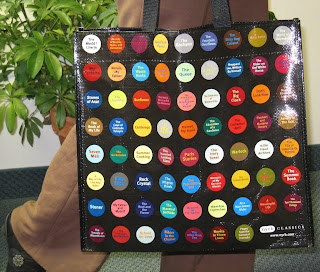Shire also b
 oasts what has to be my favourite author name of all-time - Twigs Way, author of books on topiary, garden gnomes and vegetable allotments. (The name initially conjured up the image of a friendly, grandfatherly-like gardener in tweed with a peaked cap, but in fact the author is a female archaeologist and historian and has endeared herself to me even more because she supports the Rabbit Welfare Association that helps improve the lives of pet rabbits of which she has fourteen, adopted from rescue centres. Next to Jonathan Coe, she's the author I'd most like to have a cup of tea with. Honestly.)
oasts what has to be my favourite author name of all-time - Twigs Way, author of books on topiary, garden gnomes and vegetable allotments. (The name initially conjured up the image of a friendly, grandfatherly-like gardener in tweed with a peaked cap, but in fact the author is a female archaeologist and historian and has endeared herself to me even more because she supports the Rabbit Welfare Association that helps improve the lives of pet rabbits of which she has fourteen, adopted from rescue centres. Next to Jonathan Coe, she's the author I'd most like to have a cup of tea with. Honestly.)I've just finished reading a delightful new book published by Shire and
 written by Sarah Jane Downing called Fashion in The Time of Jane Austen. Downing looks at the fashion trends between 1791 and 1817 during the years when Austen was at the height of her writing career, a period described as, "a unique moment in fashion unequalled in its daring nudity, cropped hair and masculine styling until the jazz age nearly a century later." She shows how the French Revolution, the Napoleonic wars, Beau Brummel and the works of Sir Walter Scott and Lord Byron all influenced how women, men, children and Austen characters dressed and how their clothes not only defined their status in society but also how they quite literally moved within in. Shoes and accessories are also covered. I learned some fascinating tidbits of social history such as the use of "falsies" by men which were inserted into their tight fitting breeches in order to make their calves look more "poetic", or the invention of what sounds like the equivalent of today's Spanx - a tube of flesh-coloured knitted stockinette worn tight around the legs so that the airy material of the dresses wouldn't too clearly expose the outline of the buttocks or - most scandalous of all - get caught between them!
written by Sarah Jane Downing called Fashion in The Time of Jane Austen. Downing looks at the fashion trends between 1791 and 1817 during the years when Austen was at the height of her writing career, a period described as, "a unique moment in fashion unequalled in its daring nudity, cropped hair and masculine styling until the jazz age nearly a century later." She shows how the French Revolution, the Napoleonic wars, Beau Brummel and the works of Sir Walter Scott and Lord Byron all influenced how women, men, children and Austen characters dressed and how their clothes not only defined their status in society but also how they quite literally moved within in. Shoes and accessories are also covered. I learned some fascinating tidbits of social history such as the use of "falsies" by men which were inserted into their tight fitting breeches in order to make their calves look more "poetic", or the invention of what sounds like the equivalent of today's Spanx - a tube of flesh-coloured knitted stockinette worn tight around the legs so that the airy material of the dresses wouldn't too clearly expose the outline of the buttocks or - most scandalous of all - get caught between them!The book is amply filled with colour plates of paintings and illustrations from the newspapers and fashion magazines of the era. This is a must read not only for Jane Austen fans, but anyone who loves the history or literature of this period, who likes to watch historical dramas on TV, or simply loves their clothes. And here's a funny blog post on the recycled costumes used in various BBC literary adaptations from the terrific blog Jane Austen's World that not only covers all things Austen, but is a great resource for researching more about fashion during the Regency era.
















































